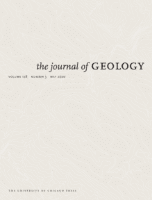
JOURNAL OF GEOLOGY
Scope & Guideline
Connecting Scholars to the Heart of Earth Sciences.
Introduction
Aims and Scopes
- Geochemistry and Petrology:
The journal publishes studies on the chemical composition and mineralogical characteristics of rocks, including their formation processes and the implications for crustal evolution. - Sedimentology and Stratigraphy:
Research in this area explores sedimentary processes, facies analysis, and the stratigraphic record, helping to reconstruct past environments and geological history. - Structural Geology and Tectonics:
Papers often focus on the structural evolution of geological formations, including faulting, folding, and the implications of tectonic processes for regional geology. - Paleontology and Paleoenvironmental Studies:
The journal includes studies on fossil records and ichnology that provide insights into ancient ecosystems and environmental conditions. - Geological Hazards and Environmental Geology:
Research on geological hazards such as landslides, volcanic activity, and their impacts on human activities and ecosystems is a significant focus area. - Geochronology and Isotope Geochemistry:
Studies employing U-Pb dating, isotopic analysis, and other geochronological methods to determine the age and evolution of geological materials are emphasized.
Trending and Emerging
- Geohazards and Natural Disasters:
There is an increasing focus on understanding geological hazards such as landslides and their spatial datasets, reflecting a growing concern for disaster risk management and mitigation. - Geospatial Technologies and Remote Sensing:
The application of remote sensing and geospatial analysis techniques in geological studies is becoming more prevalent, indicating a trend towards integrating technology with traditional geological research. - Environmental Geochemistry:
Research that examines the geochemical aspects of environmental issues, such as pollution and resource management, is gaining traction, highlighting the connection between geology and sustainable development. - Hydrogeology and Aquifer Studies:
Emerging studies on aquifer systems and their hydrogeological characteristics demonstrate a trend towards understanding groundwater resources and their management. - Paleoenvironmental Reconstruction:
An increasing number of studies are focusing on paleoenvironmental reconstructions using various geological proxies, emphasizing the importance of understanding historical ecological conditions.
Declining or Waning
- Volcanology:
Research specifically focused on volcanic processes and products appears to be less frequent, possibly due to a shift towards more integrated studies that consider volcanism in conjunction with other geological processes. - Marine Geology:
There has been a noticeable decrease in publications specifically addressing marine geological processes or sedimentation, suggesting a possible waning interest in this niche area. - Paleoclimatology:
Studies centered on reconstructing past climate conditions through geological proxies have become less prominent, indicating a potential shift towards more contemporary environmental studies. - Mineral Exploration Techniques:
While mineral exploration remains relevant, specific methodologies and techniques in this area are being overshadowed by broader environmental and sustainability concerns in geological research.
Similar Journals
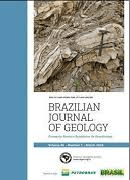
Brazilian Journal of Geology
Connecting Research and Real-World ApplicationsBrazilian Journal of Geology, the flagship publication of the SOC BRASILEIRA GEOLOGIA, has been a beacon of geoscientific research since its inception in 2013. With an ISSN of 2317-4889 and an E-ISSN of 2317-4692, this open-access journal has facilitated the dissemination of high-quality research across various branches of geosciences, making it freely accessible to a global audience since 2014. Hailing from Brazil, the journal proudly holds a Q2 ranking in Earth and Planetary Sciences as of 2023, and ranks #73 out of 195 in Scopus, indicating its growing impact and relevance in the field. The Brazilian Journal of Geology aims to bridge diverse geological studies with interdisciplinary approaches, promoting the understanding and application of geology in addressing contemporary scientific challenges. As it converges research from 2013 to 2024, the journal not only enriches the academic landscape but also serves as a vital resource for researchers, professionals, and students eager to explore the complexities of the Earth and its processes.
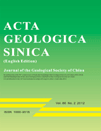
ACTA GEOLOGICA SINICA-ENGLISH EDITION
Fostering Collaboration in the Geosciences CommunityACTA GEOLOGICA SINICA-ENGLISH EDITION is a distinguished academic journal published by Wiley, providing a platform for cutting-edge research in the field of geology. With an ISSN of 1000-9515 and E-ISSN 1755-6724, this journal has been a pivotal resource since its inception in 1988, catering to scholars and professionals until 2024. The journal is recognized for its high-quality articles, achieving a Q2 ranking in the field of Geology according to the 2023 category quartiles, and ranks #122 out of 321 in the Scopus Earth and Planetary Sciences sector, placing it within the 62nd percentile among its peers. Although currently not available as an open access publication, it remains a significant repository of knowledge that supports ongoing geological research and exploration. For researchers, students, and professionals looking to deepen their understanding of geological sciences, ACTA GEOLOGICA SINICA-ENGLISH EDITION stands as an essential journal, promoting collaboration and innovation in the earth sciences.
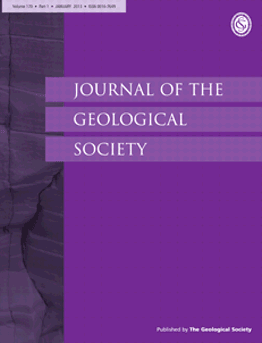
JOURNAL OF THE GEOLOGICAL SOCIETY
Empowering Geoscientists with High-Impact ResearchJOURNAL OF THE GEOLOGICAL SOCIETY, published by GEOLOGICAL SOC PUBL HOUSE, is a premier academic journal dedicated to advancing the field of geology. With a rich history dating back to 1845 and continuously published until 2024, this journal caters to a diverse audience of researchers, professionals, and students involved in earth sciences. The journal is recognized for its high impact factor, situating it in the top Q1 category in the field of geology, as indicated by its impressive Scopus rank of #49 out of 321, positioning it at the 84th percentile in Earth and Planetary Sciences. This esteemed scholarly platform promotes rigorous peer-reviewed research, ensuring that novel findings contribute to the global geological discourse. Although it operates under a subscription model, the journal's archive offers valuable insights for anyone pursuing excellence in geological research. The JOURNAL OF THE GEOLOGICAL SOCIETY stands as a vital resource for disseminating scientific knowledge and fostering educational growth within the field.
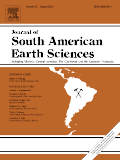
JOURNAL OF SOUTH AMERICAN EARTH SCIENCES
Pioneering Research in South American Earth SciencesJOURNAL OF SOUTH AMERICAN EARTH SCIENCES is a premier interdisciplinary journal dedicated to publishing high-quality research in the fields of Earth-Surface Processes, Geology, and Paleontology, making it an essential resource for scientists and researchers focused on South American geology and its diverse geological phenomena. Published by Pergamon-Elsevier Science Ltd in the United Kingdom, this journal has been instrumental in disseminating groundbreaking studies since 1988, showcasing contributions that push the boundaries of knowledge in Earth and Planetary Sciences. With an impressive Scopus ranking—positioning it in the 74th percentile for Paleontology and 71st for Geology—this journal not only reflects robust academic quality but also its commitment to addressing critical geological challenges in South America. Researchers will appreciate its objective of advancing understanding of geological processes while providing insights into past, present, and future Earth environments. Although available through traditional subscription models, the journal's vast repository of articles enriches the academic landscape, facilitating the sharing of vital research among professionals, students, and geological practitioners.
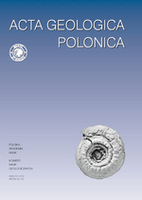
ACTA GEOLOGICA POLONICA
Exploring the depths of Earth and planetary sciences.ACTA GEOLOGICA POLONICA is a distinguished journal published by the Polska Akademia Nauk, in collaboration with the University of Warsaw's Geology Department. Since its inception, it has served as a vital platform for disseminating innovative research in the field of Geology, reflecting a commitment to advancing scientific knowledge in Earth and planetary sciences. With an ISSN of 0001-5709 and an E-ISSN of 2300-1887, this journal provides a rigorous review process and is classified in the Q3 quartile for Geology as of 2023, indicating its growing influence in the discipline. Despite not being open access, the journal facilitates meaningful contributions that span a range of geological topics from fundamental research to applied sciences, thereby enriching the academic landscape. Researchers, professionals, and students alike are encouraged to engage with the valuable findings and discussions contained within its pages, which continue to shape the future of geological inquiry.
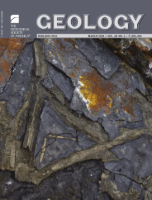
GEOLOGY
Elevating the Discourse in Earth and Planetary SciencesGEOLOGY, published by the Geological Society of America, Inc, is a premier journal dedicated to advancing knowledge, research, and discussion in the field of geology. With an ISSN of 0091-7613 and an E-ISSN of 1943-2682, this journal stands out with an impressive Q1 ranking in Geology for 2023, positioning it among the top journals in the realm of Earth and Planetary Sciences, specifically holding a remarkable rank of 11 out of 321, reflecting its 96th percentile status. This journal aims to publish innovative research articles that cover all aspects of geology, from tectonics and sedimentology to paleontology and mineralogy, offering invaluable insights for researchers, professionals, and students alike. Although not currently open access, GEOLOGY maintains a rigorous review process ensuring the quality and integrity of the research it publishes. For more than five decades, spanning from its inception in 1973 to the upcoming publications in 2024, GEOLOGY has been instrumental in shaping the geological discourse and continues to be a vital resource for the scientific community.

INTERNATIONAL JOURNAL OF EARTH SCIENCES
Pioneering Research for a Sustainable FutureINTERNATIONAL JOURNAL OF EARTH SCIENCES, published by Springer, is a leading journal in the field of Earth and Planetary Sciences, distinguished by its Q1 quartile ranking in the 2023 category of Earth and Planetary Sciences (miscellaneous). With an ISSN of 1437-3254 and an E-ISSN of 1437-3262, this journal has been a pivotal platform for researchers, academics, and practitioners since its inception in 1996. The journal's focus encompasses a broad range of topics within Earth sciences, making it a vital resource for contributions that enhance our understanding of geological processes, climate change, and planetary dynamics. The impact factor reflects its high standards and the significance of the research it publishes, ranking it in the 74th percentile among its peers as per Scopus. Furthermore, the journal offers Open Access options, facilitating the global dissemination of groundbreaking research. The editorial team is committed to advancing knowledge in Earth sciences, serving as an essential reference for students and professionals looking to engage deeply with this dynamic field.

China Geology
Innovating Geoscience Research, One Article at a TimeChina Geology, published by KEAI PUBLISHING LTD, is a leading open-access journal that serves as a pivotal platform for disseminating high-quality research across a wide spectrum of Earth sciences. Since its inception in 2018, the journal has rapidly established itself with an impressive Q1 ranking in multiple critical categories, including Geology, Economic Geology, and Oceanography, among others, reflecting its significant contribution to the academic community. Positioned as a top-tier journal in the Earth Planetary Sciences domain, it ranks #22 out of 321 in Geology and exhibits an admirable impact in sub-fields such as Earth-Surface Processes and Geochemistry and Petrology. China Geology is committed to promoting rigorous scientific inquiry and facilitating the open exchange of knowledge in the geosciences, making it an essential resource for researchers, professionals, and students eager to explore innovative developments and fundamental advances in geology. The journal’s accessibility ensures that critical findings reach a broad audience, thereby enhancing collaboration and driving forward scientific discourse in the global community.
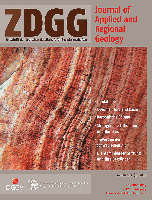
Zeitschrift der Deutschen Gesellschaft fur Geowissenschaften
Championing Earth Exploration: A Hub for Scientific InquiryZeitschrift der Deutschen Gesellschaft für Geowissenschaften is a prominent academic journal published by E Schweizerbart’sche Verlagsbuchhandlung, dedicated to advancing research in the field of Earth and Planetary Sciences. With its ISSN 1860-1804 and E-ISSN 1861-4094, this journal provides a platform for researchers to disseminate high-quality scientific articles and insights that contribute to our understanding of geological and environmental phenomena. Over the years, it has established itself as a reputable source within its category, holding a Q3 ranking among the Earth and Planetary Sciences (miscellaneous) journals in 2023, and achieving an impressive 85/195 rank in Scopus, placing it in the 56th percentile. The journal is published from Germany, specifically at Johannesstraße 3A, D 70176 Stuttgart, where it fosters a collaborative environment for scholars, professionals, and students alike. Although currently not an Open Access journal, it offers critical insights into various geoscience topics, making it an essential resource for those engaged in geological research and education. With its converged years stretching from 2008 to 2024, Zeitschrift der Deutschen Gesellschaft für Geowissenschaften is poised to continue its impactful role in the geosciences community.

GEOLOGICA BELGICA
Driving Impactful Research in Earth and Planetary SciencesGEOLOGICA BELGICA is a distinguished open access journal dedicated to advancing the field of Earth and Planetary Sciences, published by Geologica Belgica Luxemburga Scientia & Professionis. With an ISSN of 1374-8505 and E-ISSN of 2034-1954, the journal has been a beacon of knowledge since its establishment in 1998, ensuring the broad accessibility of crucial research findings. Based in Brussels, Belgium, the journal is recognized for its impactful contributions and has achieved a commendable Q2 ranking in the Earth and Planetary Sciences category for 2023. This makes it a vital resource for researchers, professionals, and students alike, encouraging the dissemination of cutting-edge research. Spanning a diverse range of topics within its scope and converging from 2007 to 2024, GEOLOGICA BELGICA remains committed to fostering dialogue and collaboration among earth scientists globally, further enhancing its relevance and influence in this essential field of study.